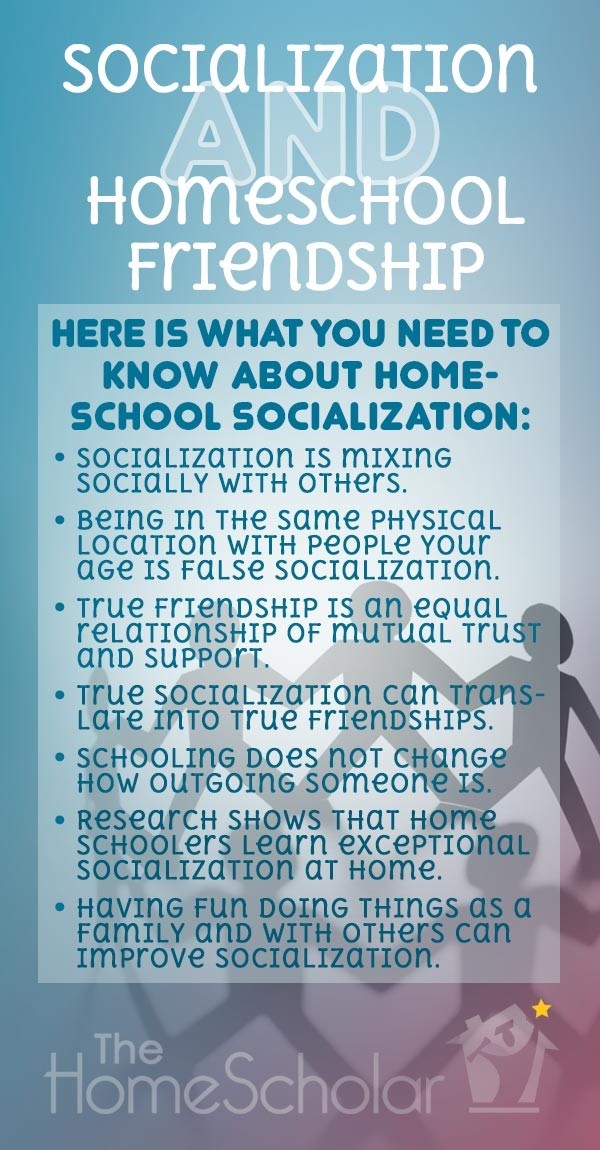Parents worry about homeschooling and socialization. Neighbors wonder if homeschoolers are weird. And kids just want to find friends. Here is what you need to know about homeschooling and socialization.
True socialization
Socialization is an activity you do – mixing socially with others – and a process of learning how to behave in a way that’s acceptable to society as a whole. Socialization isn’t something you possess, it’s something you do.
Socialization is the ability to get along with people of all ages and act appropriately. homeschooling and socialization isn’t necessarily correlated to having close friends – that’s a circumstance, not an ability. Socialization is the ability to talk to, empathize, and understand the people you meet, so that a friendship can form when circumstances permit.
False socialization
False socialization is simply being in the same physical location with people your same age for many hours at a time. False socialization is only speaking to people who listen to your music, or understand your cultural references.
Socialization is not the same as friendship. It’s possible to have true socialization and not have a lot of friends. It’s possible to be in a classroom of 30 age-mates and not have friends.
True Friendship
True friendship is an equal relationship of mutual attachment, a close bond or association – mutual trust and support. Friendship is not age-related, nor required to be outside the family.
Homeschooling and socialization can translate into true friendships when an individual meets someone they can relate to, but true friendships are not proof of true socialization. Again, finding friendships is often a result of circumstance, not an ability. When you move or have a situation change, there may or may not be an available friend. That doesn’t mean your child isn’t capable of finding or maintaining friends, however. Instead, it’s only a reflection of a temporary situation.
Inherent Personality
Schooling does not change innate personality, or how gregarious and outgoing someone is. Socialization does not change a person’s basic inherent nature. An introvert may always be introverted, and an extrovert may always be extroverted, regardless of where they happen to go to school.
Studies of Homeschool Socialization
Homeschooling and socialization go together like peanut butter and jelly. Research shows that homeschoolers do learn exceptional socialization at home. A report in Home School Researcher, Homeschooled Children’s Social Skills by Richard G. Medlin, Ph.D says, “There appears to be, therefore, a convergence of evidence from three different perspectives––parental report, objective observers, and self-report––that homeschooled children’s social skills are exceptional.”
In my own research, at my exclusive college-prep, 2-student home classroom, I can confirm that socialization is improved at home. Without naming names, a certain gregarious son was somewhat of a loud-mouthed bully in public school, while a certain introverted son was always written up in public school as “having trouble socializing.” Once they were homeschooling, though, these issues became much more moderated. My gregarious son became outgoing and charmingly friendly to everyone. My introverted son became charmingly nerdy in crowds, though still preferring to be alone. They were free to develop their true self, but with less socialization pressures or problems, and more genuine friendships.
How to Improve Socialization
Have fun doing things as a family and with others. Serve and care for others. Don’t be afraid to go into the world, providing your gifts to others as a good steward of what you have been given. Don’t become too busy with too many things, but do encourage genuine activities with a variety of people as you serve others to the best of your ability. Don’t stress too much about friendships. Friendships will follow great socialization when the circumstances present themselves.
Need more encouragement? Mark 16:15 says “Go into all the world and preach the gospel to every creature.” 1 Peter 4:9-10 says, “Be hospitable to one another without grumbling. As each one has received a gift, minister it to one another, as good stewards of the manifold grace of God.” Luke 10:27 says we are to “Love your neighbor as yourself.” Joshua 1:9 “Have I not commanded you? Be strong and of good courage; do not be afraid, nor be dismayed, for the Lord your God is with you wherever you go.”
Interacting with people in your day to day life, and serving others in a way that fits your family best, that’s the way you really improve socialization and find friendships.






Thank you, Lee! I need to continue to reflect over this article. I read it at a time when I truly needed to hear this encouragement! Thank you, Lee!!!
Lee loves to help, Alaina!
Let us know if you have questions!
Robin
Assistant to The HomeScholar